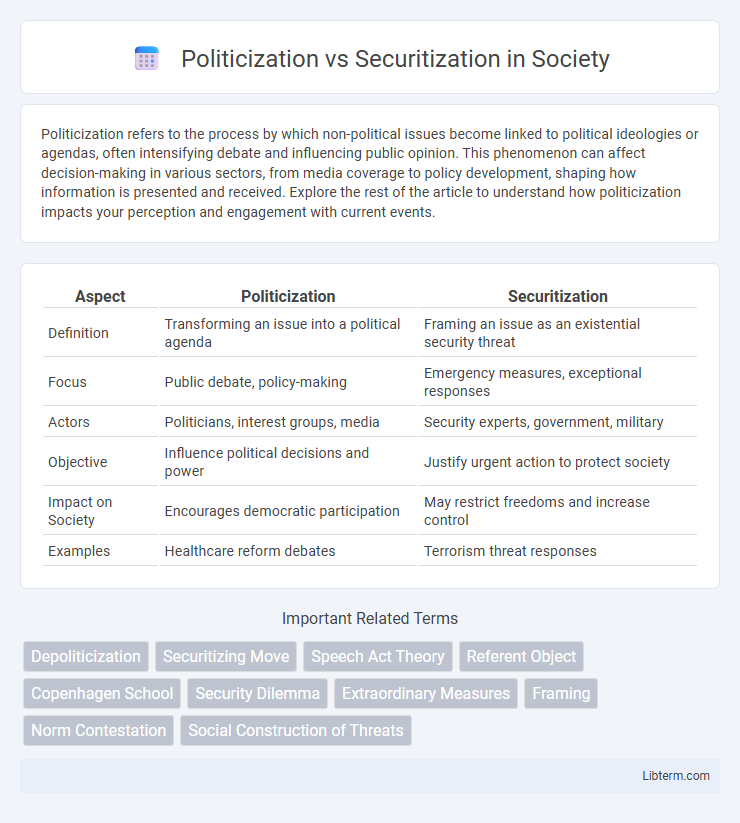Politicization refers to the process by which non-political issues become linked to political ideologies or agendas, often intensifying debate and influencing public opinion. This phenomenon can affect decision-making in various sectors, from media coverage to policy development, shaping how information is presented and received. Explore the rest of the article to understand how politicization impacts your perception and engagement with current events.
Table of Comparison
| Aspect | Politicization | Securitization |
|---|---|---|
| Definition | Transforming an issue into a political agenda | Framing an issue as an existential security threat |
| Focus | Public debate, policy-making | Emergency measures, exceptional responses |
| Actors | Politicians, interest groups, media | Security experts, government, military |
| Objective | Influence political decisions and power | Justify urgent action to protect society |
| Impact on Society | Encourages democratic participation | May restrict freedoms and increase control |
| Examples | Healthcare reform debates | Terrorism threat responses |
Understanding Politicization: Definitions and Implications
Politicization refers to the process by which issues or policies become subjects of political debate and contestation, often involving the mobilization of interests and public opinion to influence decision-making. This phenomenon transforms previously neutral or technical matters into controversy-laden topics, shaping agenda-setting and governance dynamics. Understanding politicization is crucial for analyzing how power struggles and ideological conflicts impact policy formulation and democratic accountability.
The Concept of Securitization in Contemporary Discourse
The concept of securitization in contemporary discourse refers to the process by which state actors transform subjects into matters of security, framing them as existential threats that require emergency measures beyond normal political procedures. This discourse mobilizes political power to justify extraordinary policies and often bypasses standard democratic deliberation. Unlike politicization, which involves ordinary political debate and conflict, securitization escalates issues to a higher urgency, compelling immediate and exceptional responses.
Key Differences Between Politicization and Securitization
Politicization involves framing an issue as a matter of political debate subject to public opinion and party interests, while securitization escalates a concern to an existential threat requiring emergency measures and bypassing normal politics. Key differences include the actor's intent, with politicians driving politicization versus security elites or authoritative bodies initiating securitization, and the audience's role, where politicization engages broad public discourse versus securitization seeks acceptance of extraordinary actions from a targeted audience. Politicization often results in polarization and policy contestation, whereas securitization leads to exceptional legislative or military measures justified by perceived security imperatives.
Historical Context: Evolution of Both Concepts
The historical evolution of politicization traces back to early political theory where the process denotes the transformation of issues into subjects of political debate and decision-making. Securitization emerged in the late 20th century through the Copenhagen School, defining the framing of issues as existential threats requiring emergency measures. Over time, politicization involved expanding political agendas, while securitization shifted focus toward prioritizing security and emergency legitimization beyond normal politics.
Politicization: Drivers and Consequences
Politicization arises when issues become the focus of political debate, driven by factors such as electoral competition, media framing, and interest group mobilization. This process often leads to increased polarization, shaping public opinion and policy agendas around partisan lines. The consequences include heightened societal divisions and the potential weakening of institutional trust and governance effectiveness.
The Process and Impact of Securitization
Securitization transforms issues into security threats by framing them as existential dangers requiring urgent action, often bypassing normal political procedures. This process intensifies state power and controls, impacting civil liberties by prioritizing security over democratic debate and transparency. The political implications include reinforcing state authority, shaping public perception, and potentially normalizing emergency measures in governance.
Case Studies: Politicization in Action
Politicization involves framing issues as political debates often driven by party interests and public opinion, whereas securitization transforms topics into existential security threats requiring urgent measures. Case studies of politicization in action reveal how climate change debates in the U.S. became polarized along partisan lines, influencing legislative gridlock and public skepticism. Similarly, Brexit's politicization centered on national sovereignty and immigration control, shaping voter behavior and governmental policies.
Case Studies: Securitization in Practice
Case studies of securitization in practice reveal how political actors frame issues as existential threats to justify extraordinary measures, such as the U.S. post-9/11 security policies or the European migrant crisis response. These examples illustrate the transformation of policy problems into security issues, often bypassing democratic debate and enabling rapid deployment of resources and legal powers. The analysis of securitization processes in diverse contexts underscores the strategic use of discourse to mobilize support and legitimize state actions.
The Interplay Between Politicization and Securitization
The interplay between politicization and securitization shapes how issues are framed within political discourse, influencing public perception and policy responses. Politicization involves amplifying issues through political debate and partisan interests, while securitization elevates these issues to matters of national security, justifying extraordinary measures. Understanding their interaction reveals how political agendas can manipulate security narratives to gain support or suppress dissent.
Policy Implications and Future Perspectives
Politicization often results in policies driven by partisan interests, leading to polarized decision-making and short-term gains, whereas securitization reframes issues as existential threats, enabling extraordinary measures and expanding executive power. Policy implications include the potential erosion of democratic norms under securitized agendas and the challenge of achieving consensus amid politicized debates. Future perspectives suggest a need for balancing alertness to genuine security threats with safeguards to prevent misuse of securitization, fostering resilient governance frameworks that accommodate diverse political viewpoints.
Politicization Infographic

 libterm.com
libterm.com